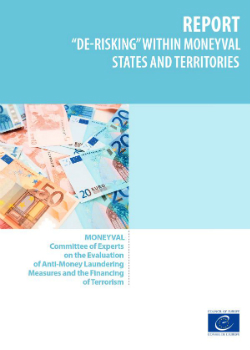De-risking
The FATF characterises “de-risking” as the phenomenon of financial institutions terminating or restricting business relationships with clients or categories of clients to avoid, rather than manage, risk in line with the FATF’s risk-based approach. “De-risking” have various reasons, such as concerns about profitability, prudential requirements, anxiety after the global financial crisis, or reputational risk.
This issue is of crucial importance for two reasons:
- De-risking can introduce further risk and opacity into the global financial system, as the termination of account relationships has the potential to force entities and persons into less regulated or unregulated channels. Moving funds through regulated, traceable channels facilitates the implementation of AML/CFT measures;
- It is essential to ensure that the global AML/CFT standard is well understood and accurately implemented, and that countries and their financial institutions are provided with support in designing AML/CFT measures that meet the goal of financial inclusion.
“De-risking” should never be an excuse for the private sector to avoid implementing a risk-based approach, in line with the FATF standards. This has been emphasised by the FATF on a number of occasions, clarifying that the Standards require the application of a case-by-case risk-based approach, as opposed to wholesale de-risking. The FATF Recommendations only require financial institutions to terminate customer relationships, on a case-by-case basis, where the money laundering and terrorist financing risks cannot be mitigated. It is, however, not in line with the FATF standards to apply wholesale cutting loose of entire classes of customers, without taking into account, seriously and comprehensively, their level of risk or risk mitigation measures for individual customers within a particular sector.
For further information on the role of risk in the implementation of AML/CFT measures, please refer to the sections Assessment of risks and Risk-based approach.
Reference documents

De-risking within MONEYVAL States and territories (2015)
The report aims to establish the extent to which “de-risking” is given consideration by MONEYVAL States and territories and how regulated entities manage risks, as opposed to avoiding them. The report is based on a questionnaire filled in by the jurisdictions, the responses to which enable MONEYVAL to understand the level of “de-risking” in its member jurisdictions. It also covers the reasons for “de-risking”, as well as sectors, products and services most affected by it.
Basel Committee on Banking Supervision Guidance 2014 - Sound Management of Risks related to Money Laundering and Financing of Terrorism
Moreover, the FATF developed a number of guidance papers, in particular with regard to the undertaking of national risk assessments, as well as for the purposes of applying a risk-based approach in the different sectors of the financial market and designated non-financial businesses and professions, reference to which is made under the respective sections Assessment of risks and Risk-based approach.
Relevant Council of Europe websites
Conference of the Parties (COP) to the CETS 198



